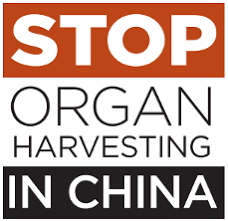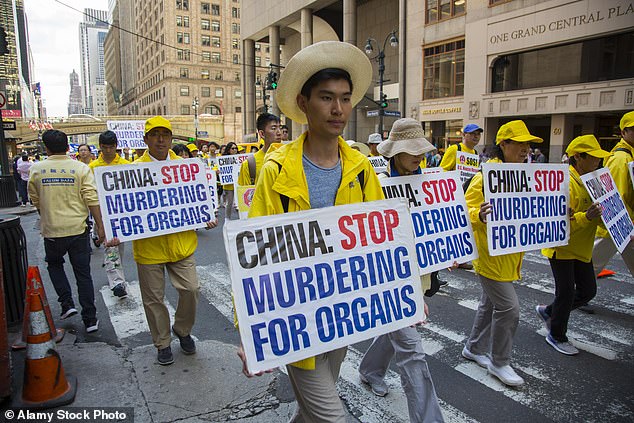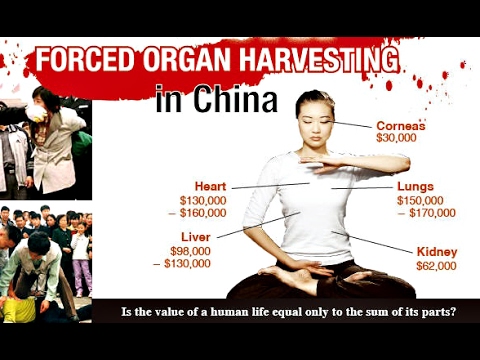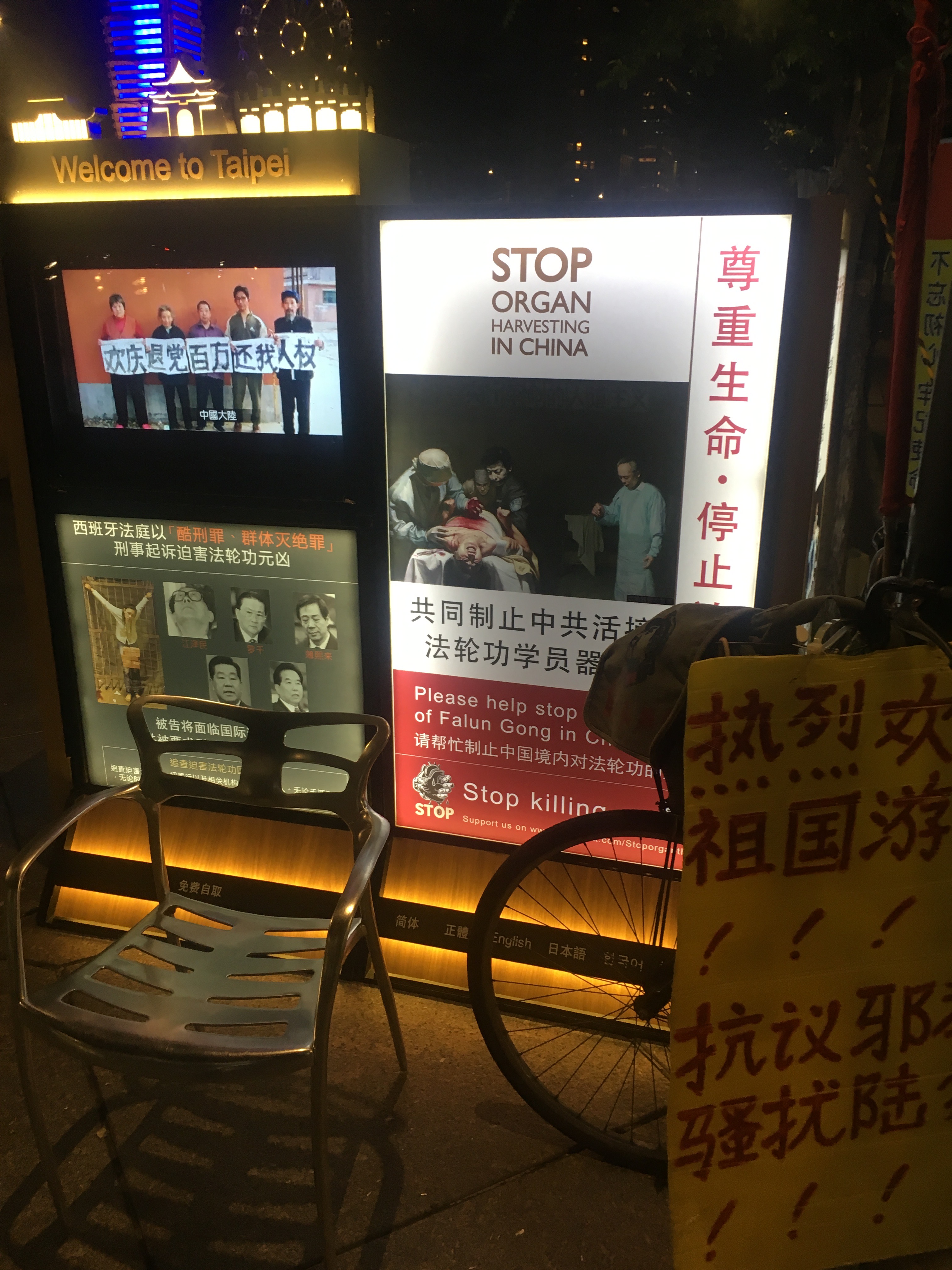Parliament hears All-Party calls for the Government to take action on the harvesting of human organs and human tissue from Falun Gong practitioners, Uighur Muslims and other religious minorities, and political dissident. An amendment has today been tabled to the Medicines and Medical Devices Bill
Extracts from speeches made on September 2nd 2020 in the House of Lords on the Medicines and Medical Devices Bill 2nd Reading
=============
Lord Hunt
Finally, I turn to the abhorrent practice of forced organ harvesting taking place in China today, and to the importance of ensuring that the UK is not in any way complicit in these crimes. In a letter to me last night, the Minister referred to the World Health Organization’s view that China is implementing an ethical voluntary organ transplant system. That is simply not credible, and in fact it is based on a self-assessment by China itself. A much more objective assessment comes from the China Tribunal, which concluded:
“Forced organ harvesting has been committed for years throughout China on a significant scale.”
At the moment, human tissue and organs can be imported into the UK from countries such as China without traceability, documentation or consent. Marie Rimmer MP tabled an amendment in the Commons to deal with this. A similar amendment will be tabled here and I very much hope that the Government will agree to it.
Also see:
Lord Collins of Highbury
My Lords, my noble friend Lord Hunt of Kings Heath mentioned the China Tribunal’s final report and its conclusions about forced organ harvesting in China. Despite the overwhelming evidence, China denies the claims, relying on the fact that the WHO cleared it of wrongdoing.
In June this year, I reminded the Minister the noble Lord, Lord Ahmad, that 12 months earlier he had shared my concern that the evidence on which the WHO had cleared China was based on self-assessment by the Chinese authorities. At that time, I asked about the Government’s response to the China Tribunal and what the result had been of representations to the WHO and the Chinese authorities. The Minister replied that the Government’s position remained that the practice of systematic state-sponsored organ harvesting would constitute a serious violation of human rights. He assured this House that the UK regularly raised these concerns with China. He also confirmed that the UK had consulted the WHO, which had restated its view that China’s system was ethical. The WHO does not have an independent expert compliance assessment mechanism; it merely has a reporting requirement. So why has the UK not argued for change within the WHO? We should all, including the UK, be ensuring that there is independent verification.
UK legislation requires prior consent and traceability for human tissue for medical research and use in medicines when sourced from the UK, but if human tissue has been imported then the consent requirements do not apply. We have seen exhibitions in New York and Birmingham, in 2008 and 2018 respectively, both of which used plastinated bodies from Dalian Hoffen Bio-Technique in Dalian in China. They were classified as unclaimed bodies with no relatives to identify them. In 2008, the New York state attorney-general required a disclaimer that included the words that the organisers
“cannot independently verify that the human remains you are viewing are not those of persons who were incarcerated in Chinese prisons.”
The UK has arguably some of the most ethical and comprehensive consent requirements for human tissue in the world, yet imported human tissue slips through the net. It has also been reported that two UK companies supply organ-preserving devices to mainland China, which could explain how they are being transported around China.
I hope the Minister will heed the words of my noble friend Lord Hunt of Kings Heath and other noble Lords and ensure that the Government have the means to ensure that the UK is no longer complicit in the harvesting of human organs from living victims.
Baroness Northover
Consistent with the need to maintain standards, I come to my second area, where I fully endorse what the noble Lords, Lord Hunt and Lord Collins, have said about imported human tissue and biological medicines. We simply cannot allow human tissue from victims of forced organ harvesting to enter the UK. We have become more aware in recent times of the treatment in China of the Falun Gong and the Uighurs. The China Tribunal, chaired by Sir Geoffrey Nice, released its full report in March. Has the Minister read the report? Forwarding the letter from the WHO to the noble Lord, Lord Hunt, when he must know the current constraints on the WHO, is, frankly, astonishing. If the Minister has read the report, he will know the tribunal concludes that crimes against humanity have been committed against these groups beyond reasonable doubt.
As the noble Lord, Lord Hunt, noted:
“Forced organ harvesting has been committed for years throughout China on a significant scale and that Falun Gong practitioners have been one – and probably the main – source of organ supply.”
With regard to the Uighurs, the tribunal says it has
“evidence of medical testing on a scale that could allow them, amongst other uses, to become an ‘organ bank’.”
We now hear that they are being used for unapproved Covid vaccines.
The Human Tissue Act 2004 has strict requirements for tissue sourced within the UK, but it does not restrict imported tissue in this way. That gap must now be filled if we are to maintain that the UK has the highest standards in this area. The Minister will be hearing the signs of cross-party support, and I trust that the forthcoming amendment will be immediately accepted by the Government. That is clearly right, but it is also vital if the UK is to remain a leader in the life sciences field. There are many challenges that this field now faces.
also see:
https://www.gresham.ac.uk/lectures-and-events/human-rights-china
Lord Alton
Like others, I would like to see the Bill tackle the misuse of human tissue and organs. In the letter sent yesterday by the Minister, he says the
“government takes these allegations seriously and we continue to monitor all available evidence”,
but monitoring is simply not enough.
Two years ago, in August 2018, along with Professor Jo Martin, the president of the Royal College of Pathologists, I wrote to the Times after the NEC in Birmingham hosted the exhibition referred to by the noble Lord, Lord Collins. It was called “Real Bodies” and from the company Imagine Exhibitions. The exhibition consisted of human corpses and body parts. It advertised those exhibits as
“real human specimens that have been respectfully preserved”.
They were categorised as “unclaimed bodies”, with no relatives to identify them. As we heard, in advance of the American equivalent of that exhibition it was stated in a disclaimer —after a settlement with the New York State Attorney-General—that these human remains could be those of persons who were incarcerated in Chinese prisons. Imagine Exhibitions admitted that there was no documentation to prove the identities of the cadavers, yet they were permitted to enter the UK to be put on public display for commercial gain. Human tissue from abroad has no consent or traceability requirements to enter the UK, nor do we prohibit commercial gain. However, we should do and this Bill gives us the opportunity to do it.
also see:
Lord Ribeiro
Finally, on organ donation—we have heard much of this from the noble Lord, Lord Hunt, the noble Baroness, Lady Northover, and others—in a study published in BMJ Open, ethical issues were raised
over the estimated 85,477 organ transplants in China. Ninety-nine per cent of the 445 studies failed to report whether the organ donors had given consent to transplantation. The paper concluded:
“The transplant community has failed to implement ethical standards banning publication of research using material from executed prisoners. As a result, a large body of unethical published research … exists, raising questions of complicity to the extent that the transplant community uses and benefits from the results of this research.”
The noble Lords, Lord Alton and Lord Hunt, and the noble Baroness, Lady Finlay, will be bringing forward an amendment on this issue which I plan to support.
Baroness Butler-Sloss
My Lords, I will raise two issues, the first being organ harvesting. I propose to support the amendment of the noble Lord, Lord Hunt of Kings Heath, and the noble Baroness, Lady Finlay of Llandaff. Like other noble Lords, I am very concerned by the activities in China. There are other countries where organs, particularly kidneys, are also sold, and we should not be allowing them to be used in this country.
Lord Balfe
I support the idea of a commissioner for patient safety. I hope that the Minister will go away and work out how it is to be done before he gets defeated on the Floor of the House. I also believe that the proposal on the harvesting of organs will not get through this House, and there will be an amendment on that. I say to the Minister: please do your homework and bring us something that we can agree with. Otherwise, the Government are going to get defeated.
Baroness O’Loan
My Lords, I would like to thank the noble Baroness, Lady Cumberlege, for her excellent work on the report that she has presented to the House. I would like to support her recommendations, and most particularly her recommendation for a patient safety commissioner.
This is an important Bill, and there is an opportunity presented by it to improve the regulation of human organ harvesting across the world. Organ transplantation is one field of medicine that offers great hope to the recipient. Organs are taken from deceased donors in particular circumstances and for years living donations have been possible. A person can donate a kidney, part of a liver and so on, and live perfectly well afterwards. I have seen it. It can make the difference between life and death. It is a rapidly growing field of medicine in which demand exceeds supply.
Here in the UK, we have stringent regulation of the process of organ donation to ensure that those who donate are protected and that donation is only allowed from those who are fit and are willing to donate without any payment but to help someone else. That is how it should be and at its best this is a wonderful development. Similarly, organ transplantation after death can, in the right circumstances, bring untold blessing to those who receive an organ.
However, the very fact that demand for organs for transplant exceeds supply means that there is a market in organ harvesting, both from the living and the dead. For decades, people have been forced through poverty to sell their own organs. This is unethical and wrong. There should be no support for such practices, and we must ensure control over any contribution made by British companies that enable such activity.
We know, too, that there is transplant tourism, where people travel to countries where they may be able to get a transplant, in some cases with few questions asked about where the organ donated to be transplanted came from. We know, too, that organs can be shipped and transplanted into recipients across the world without proper procedures. There continues to be a major problem in the lack of global control over organ harvesting. There has been a reference to the work of the China Tribunal and to reports of a state-run programme of forced organ harvesting in China, the organised butchery of living people to sell body parts, which the China Tribunal compared to the
“worst atrocities committed in conflicts of the 20th century.”
We know that Uighurs, Falun Gong practitioners and others are being killed and subjected to forced organ harvesting.
When an organ is taken, whether from a living or a dead body, it needs to be preserved and transported to its destination. Just as we now require that imported products, whether they be clothes or anything else, should be manufactured in ethical conditions, we need to ask ourselves whether British manufacturers are selling to China the devices, medicines and technology which will enable China to sell organs which have been harvested from people in China’s detention camps or otherwise wrongly obtained. There could be many spin-offs from such activity, including the use of such organs—that can be imported here without any evidence of consent or traceability—for medical research, a market in immunosuppressant drugs for the recipient, and a market in harvested organs which might even be imported and used here in the absence of full regulation.
China is not self-sufficient; it is highly reliant on the West for the equipment and medicines which it needs to help its organ transplant and harvesting industry. The extent of British engagement is not immediately accessible in the context of the Chinese organ transplantation process. The report The Economics of Organ Harvesting in China indicates that there are British companies with interests in this area—in research and in producing and selling organ-preservation solutions to China.
It is right to support and develop ethical, regulated organ transplantation. It is profoundly important that this Bill provides for proper regulation. We can provide regulation to prevent companies being empowered and enriched by the mass crimes that may be facilitated elsewhere. This will show the People’s Republic of China and the Chinese Communist Party that the balance between human rights and commerce will change.
We need to think very carefully about how this Bill will proceed, so that it does that which it seeks to do and protects the health and safety of those who may be forced organ donors.
Lord Sheikh
Finally, I have three more questions for my noble friend to address. First, under Part 1 of the Bill, will there be provisions to regulate alternative medicines, as some of these can cause serious problems? Secondly, what measures are being taken to prevent the importation of medicines from countries where human organs have been removed for medical testing? Falun Gong and Muslim Uighurs are subjected to these horrible practices in China. I am also concerned about tackling antimicrobial resistance. Can the Minister assure us that this issue will be looked into as a matter of priority?
Lord McColl of Dulwich
I emphasise that in Committee I shall fully support the amendments in the names of the noble Lord, Lord Hunt of Kings Heath, and the noble Baroness, Lady Finlay of Llandaff, dealing with forced organ harvesting. As mentioned before, Sir Geoffrey Nice QC stated in his report that forced organ harvesting has been committed for years throughout China. [Inaudible.]
Baroness Finlay of Llandaff
Regarding China’s organ harvesting and experimentation on detained citizens, the Minister wrote to me last night, citing the WHO’s view as reassuring. It is not, as many noble Lords have already pointed out. Consent documentation for tissues from outside the UK is required only on an advisory basis. It must be statutory. There are now reports of Covid vaccine experiments in China being carried out on prisoners without consent. The UK cannot ignore increasing evidence of abuses, so I will co-sign an amendment to close the glaring gap. The Government can then prove that they really take this extremely seriously.
Lord Mackay of Clashfern
My second point is in relation to tissue. I strongly support all that has been said about that already.
Response from the Government Minister, Lord Bethell
On China and organs, I have heard clearly the points of the noble Lords, Lord Hunt, Lord Collins, Lord Sheikh and Lord Alton, the noble and learned Baroness, Lady Butler-Sloss, the noble Baronesses, Lady O’Loan and Lady Northover, and my noble friends Lord McColl and Lord Ribeiro on imported human tissue, the suggested role of British firms in enabling this trade, the plight of the Falun Gong and the Uighurs, and potential forced organ donors. As the noble Lord, Lord Alton, put very clearly, the idea that British companies are profiting from these trades is abhorrent.
.




Also see:
Details of an all-party amendment tabled to the Medicines and Medical Devices Bill – which will be considered in the House of Lords at Committee Stage y Lord Hunt of Kings Heath, Baroness Finlay, Baroness Northover and Lord Ribeiro:
Member’s explanatory statement
This amendment adds the origin and treatment of human tissue, including human organs, to the list of matters about which regulations may be made by the appropriate authority, in the context that informed, valid, uncoerced and demonstrably documented consent may not have been given for the harvesting of such human tissue and organs

